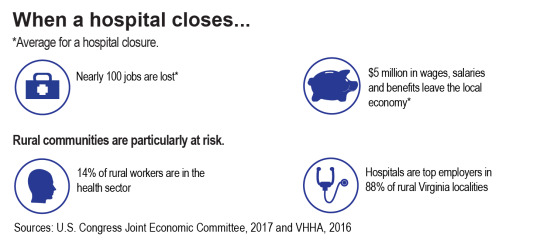March 29, 2018
Lawmakers Have an Opportunity to Support Rural Hospitals
Many of Virginia’s rural hospitals are facing financial challenges. In 2015, almost half of the state’s rural hospitals were operating in the red, and the situation is projected to get worse in the years ahead. Yet policymakers have an opportunity to help fix this. When the General Assembly returns on April 11 to finish work on the state’s two-year budget, lawmakers will again face the decision of whether to accept federal funds to expand health coverage to more low-income Virginians. When it comes to supporting rural hospitals, the decision is straightforward. Reducing the number of uninsured Virginians through Medicaid expansion will help rural hospitals keep their doors open.
By boosting the ranks of the insured population, Medicaid expansion serves as a safeguard for rural hospitals. And it seems to be working. Rural hospitals in Medicaid expansion states have had their bottom lines strengthened when compared to urban hospitals. States that expanded their Medicaid programs also saw a 30 percent average reduction in uncompensated care costs, which bolstered hospital balance sheets. This contrasts to the situation in the minority of states, like Virginia, that have not expanded Medicaid, where hospitals are stuck footing the bill for a larger share of those costs.
Unless something is done, the problem of uncompensated care costs is on track to become a much bigger challenge in the next few years in non-expansion states like Virginia. Disproportionate Share Hospital (DSH) payments, a program to offset the costs of providing care to patients who lack health insurance and can’t afford to pay out-of-pocket, are scheduled to decline sharply because federal policymakers assumed states would expand their Medicaid programs and reduce the number of uninsured patients. For rural hospitals, which serve a larger share of patients with uncompensated care needs, DSH reductions would squeeze their margins particularly hard. These reductions are scheduled to take effect in 2020 and, due to a two-year delay that was recently agreed to, will be even steeper than originally planned in future years. Virginia lawmakers should act now to expand health coverage and minimize the looming threat posed to rural hospitals by large DSH payment cuts.

Rural hospitals are a vital part of rural communities, often the largest employer and provider of health services in a given area. But too many of these institutions are being stressed by an unsustainable status quo. Expanding health coverage for low-income Virginians would put the state’s rural hospitals and communities on a better path. It’s up to lawmakers to act.
Category:
Health Care
